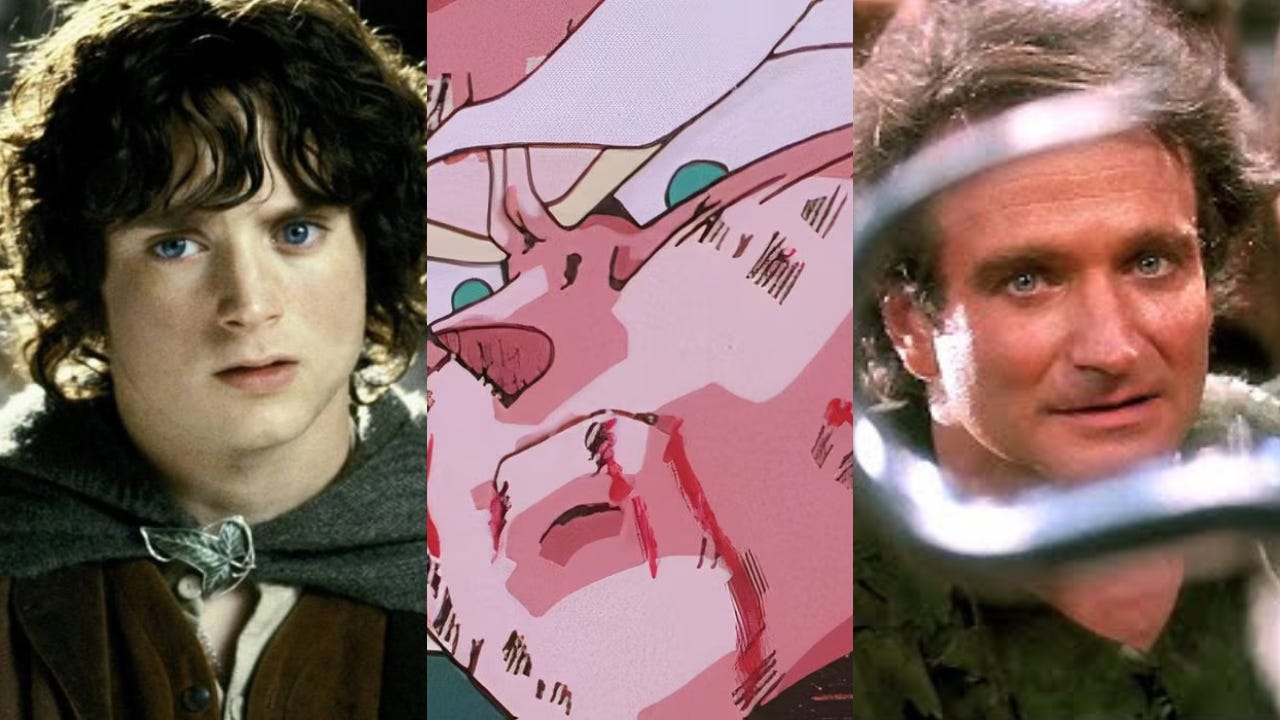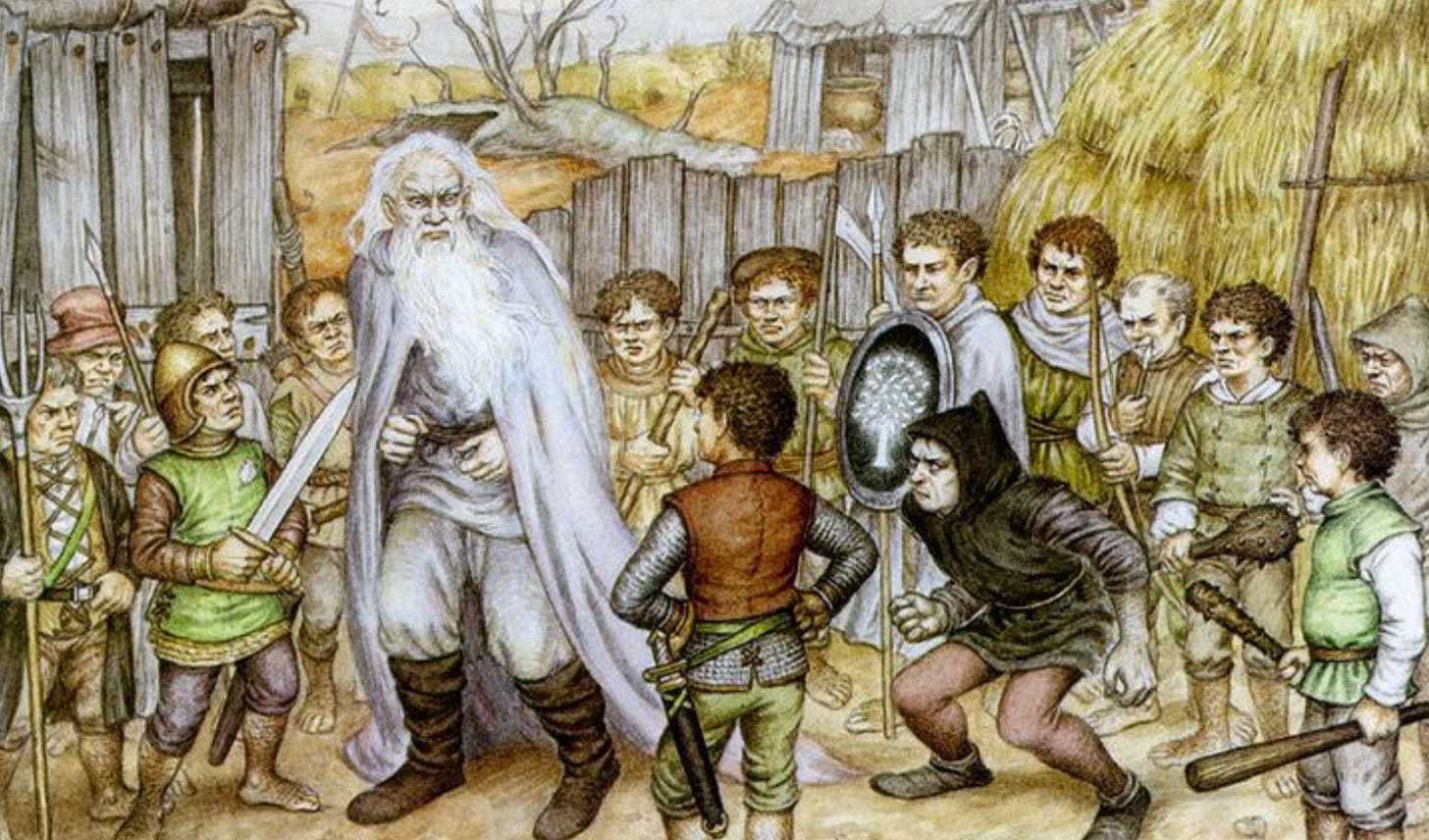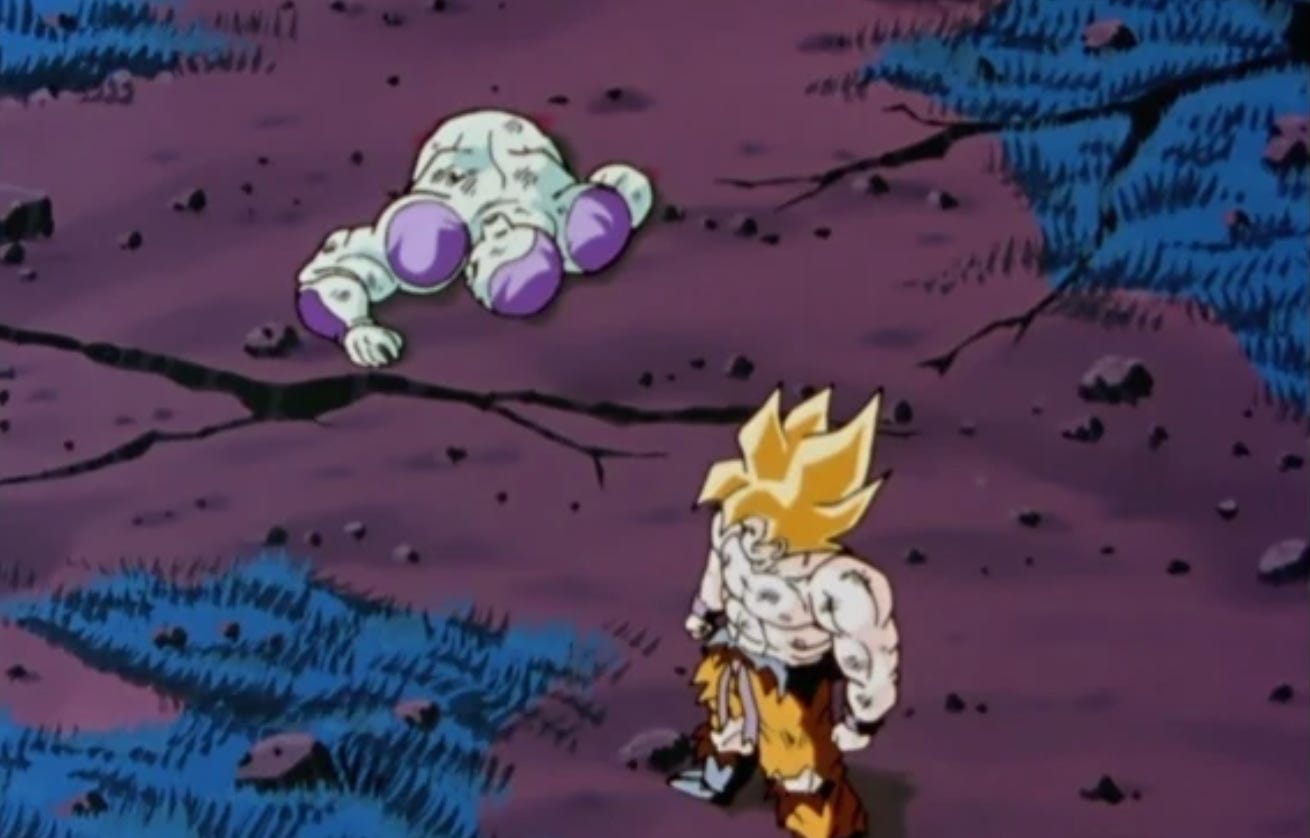When They Plead 'Mercy'
Peter Pan, Goku and Frodo have something in common
I’ve been thinking a lot lately about Mercy. You know what it looks like. It’s when the king or hero spares the neck of someone who has committed an offense against them or the community. I’ll have to ask YOUR mercy for not sending an email for quite a while — my laptop broke and was in the shop for 10 days. So we’re back up and running now, and Geeky Stoics can continue…
It occurred to me the other day that three of my favorite stories all end the same way. There’s probably way more than haven’t occured to me.
Hook (A Peter Pan story), Dragon Ball Z’s Frieza Saga, and The Lord of the Rings.
Heroes don’t relish the taking of life, just like a loving parent doesn’t enjoy delivering a punishment. You do it because the other party took peace off the table, and you have to make clear that certain things will not be tolerated in the future.
Peter Pan
In Steven Spielberg’s highly underrated Peter Pan movie, Hook, starring Robin Williams as a grown-up Pan, Captain Hook kidnaps Pan’s two young children to lure him back to Neverland for a duel.
Peter Pan wins, of course. And in his victory, the moment comes where Hook kneels at the edge of Pan’s sword. Like Darth Vader, broken and lying at Luke Skywalker’s feet, Hook is beaten, and Peter has a choice to make.
Mercy….or the law of the jungle, if you will?
Pan’s young child runs up and intervenes in what can only be described as Exhibit A of the “Empathy” debate. “Daddy, let’s go home, please? He’s just a mean old man without a mommy.” (Clip below)
You hear this kind of talk a lot out in the real world. Public virtue today seems to hinge solely on understanding why people commit acts of evil or harm others. There is some merit to this, but it can be just as much of a vice as a virtue….
Let this person off the hook because….
They had a rough childhood.
They were victimized once, too.
Mental illness.
Systemic racism.
Etc etc.
You know how this goes. Personal agency and free will go out the window. Something else must be to blame. The Stoic philosophers don’t speak with one voice on this issue, and you can derive a number of messages from the works of Marcus Aurelius, Seneca, Epictetus, and Zeno on how to process anti-social behavior. The most obvious Stoic view is that you should view bad behavior as stemming from ignorance or a lack of proper training.
To feel affection for people even when they make mistakes is uniquely human. You can do it, if you simply recognize: that they act out of ignorance, against their will… they haven’t really hurt you. They haven’t diminished your ability to choose. - Marcus Aurelius
It sounds an awful lot like Aurelius would agree with Pan’s daughter. Hook just “didn’t have a Mommy” and was therefore cut off from wisdom, so what is one to expect of him other than malice and bad behavior?
But that misses the point. The Stoic view of bad action is that you, for your own sanity, should choose to process their behavior in this light. Doing so expands your capacity to grant mercy and goodwill on the little things.
It’s practice.
Someone looks at you funny, or your friend doesn’t laugh at your joke….and so you use your training and choose not to assume malice or ill will. You assume innocent reasons for the facial expression they made, or assume your friend either didn’t hear you clearly or didn’t understand the joke.
You’re training yourself not to assume the worst when no one hits Like on your post or taps the <3 reaction on your Reel.
Anyways….back to Neverland. Pan’s son joins the chorus in pulling his Father away from executing Hook on the spot. “He can’t hurt is anymore. Let’s go.”
But he can. And Hook does try to hurt them again. As Peter turns his back to leave, Hook draws a hidden blade and goes back in for the kill.
Clemency has to draw from the proper well of wisdom in order for it to be truly just. Seneca wrote about this in his text On Clemency, which examines the balance required between leniency and capital punishment in a truly just society. The text is useful not just for rulers, but for parents, teachers, and anyone who finds themselves in the business of discipline.
We all will make these kinds of choices.
It is an equal Cruelty to pardon All, and to pardon None. It must… separate the curable from the desperate; where the matter is in balance, let Mercy turn the scale. - Seneca, “On Clemency”
Mercy should be informed by an understanding of what’s important to you. One could argue that Peter Pan was right to spare Hook, as the whole movie is about restoring a bond with his children. It might not be wise to execute someone in front of them. But he didn’t have to let Hook go free….
Frodo
Frodo Baggins faces a similar hinge moment that didn’t make it into the beloved movies by Peter Jackson. The wizard Saruman survives his downfall and loss of power, then makes his way to the Shire under the name “Sharkey,” and wreaks havoc there. Eventually, he is subdued.
“It is useless to meet revenge with revenge; it will heal nothing,” says Frodo in Tolkien’s final installment to The Lord of the Rings. It’s a true marker of wisdom earned by his ordeal carrying the Ring and suffering in order to return to the quietude of the Shire.
Frodo’s inclination toward mercy, in this instance, toward the disgraced wizard Saruman, has little to do with a legalistic calculation of Saruman’s crimes or the mathematically reasonable sentence for each count.
Despite the clamoring of his friends for Saruman to be executed on the spot while he is at their mercy, Frodo does not want blood spilled on the precious soil he fought so hard to defend from the evils of war. He carried the Ring from the Shire to Mordor so that Mordor would not come to the Shire. Saruman taunts the hobbits with a sad truth:
“If my blood stains the Shire, it shall wither and never again be healed.”
It is an innocent, beautiful place. Frodo aims to keep it that way. He will not be anyone’s executioner. They spare Saruman…and still he lunges with a knife and tries to stab Frodo. The knife fails to penetrate Frodo’s chainmail. Still, they tell him to leave and never return. Saruman agrees, but moments later, he is stabbed to death by a vengeful henchman who is tired of being talked down to.
Saruman met his end regardless.
So does Hook, actually. Peter doesn’t have to kill him. After Hook attacks, Pan is able to knock him back, and by good fortune alone, a large structure falls on Hook — ending him once and for all.
Goku
Which brings me to the planet Namek. Goku has defeated the warlord Frieza, responsible for the murder of millions, including close friends of Goku. Frieza has been severed in two and will die a slow death. Goku relents and grants Frieza just enough energy to leave and “sin no more”, as it were. He always prefers to grant mercy.
Like Peter Pan, Goku turns his back, and Frieza still attacks.
“No father in his right wits will disinherit a son for the first fault… There must be many and great offenses, and only desperate consequences should bring him to that resolution… If there must be an amputation, let him come slowly to it; and when the part is cut off, let him wish it were on again.” - Seneca
Like a rabid dog that cannot be reasoned with or talked into doing the right thing, Frieza forces Goku’s hand. It’s an iconic moment for Goku and the entire Dragon Ball Z franchise. The cold and god-like glare of Goku as he turns around to see Frieza’s stupidity on full display.
“YOU FOOL!” Goku shouts from above. He responds to Frieza’s attack with deadly force, and Frieza is no more.
There’s something to be said for Goku’s words. He doesn’t hate Frieza. Goku is amazed at how foolish his enemy is, completely divorced from reality and reason.
“Forgive them Father, they know not what they do,” echoes in the background of moments like this.
Evil can indeed stem from ignorance and a bad upbringing. Frieza’s father was also a warlord and killer. It’s like he was going to be given the chance to be a poet or a painter.
But he was given the gift of life, and he was shown mercy by an enemy. It was modeled in real time for Frieza. Still, he couldn’t reciprocate.
Maximum discipline was called for because Frieza was not going to use the second (or third) chance he was given to do good and protect life. He was going to harm more people. Discipline is most called for in defense of the community, of others who will be in harm's way if mercy is misapplied.
Goku takes Frieza’s choices off the table.
This was a long read. So if you’re still with me, I hope you found this worthwhile. My goal here is to keep searching through these stories for an answer to how to balance Empathy, Pity, and Mercy with Compassion, Duty, and Maximalism.
We’ll all have to face scenarios like this, likely less dramatic, but you never know. Times won’t always be as simple as they are right now. Best to think these things through while you can.






The final episodes of Avatar the Last Airbender have a similar question with Aang grappling how to defeat the Fire Lord without killing him.